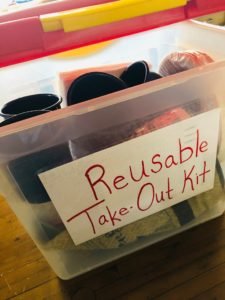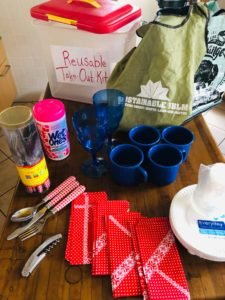
By Bardia Khajenoori
U.S. Army Garrison Stuttgart
Erick Posner has noticed a few things during the coronavirus pandemic and its resulting lockdown periods.
Things like masks and gloves littering streets and shopping carts. Fewer personal vehicles traveling through Stuttgart city center. The fact that his household was going through more trash and recyclables than before, and how much of that consisted of plastic containers from restaurants, which, for much of the time, have only been allowed to serve meals to-go.
As it turns out, Posner’s observations touch on several key aspects of the pandemic’s larger environmental impact—one that has yet to be fully determined.
He was one of the millions of people unable to fly regularly for leisure last year, and that collapse in air travel (along with decreased commuting) is reflected in statistics.
Global greenhouse gas emissions fell 7% in 2020 compared to the year before, representing the largest decline on record, according to a British study reported by CNBC. The study indicated that the decline was primarily due to a decline in transportation activity related to COVID-19 restrictions and that emissions will likely rebound in 2021.
And while one form of pollution decreased, albeit temporarily, another increased dramatically: the marine conservation organization OceansAsia estimated that over 1.5 billion face masks entered oceans in 2020, resulting in an additional 4,680 to 6,240 metric tons of marine plastic pollution.
OceansAsia noted that plastic consumption increased significantly due to the pandemic.
“Hygiene concerns and greater reliance on take-away food has led to increased use of plastics, particularly plastic packaging,” said Gary Stokes, the group’s director of operations. “Meanwhile, a number of measures designed to reduce plastic consumption…have been delayed, paused, or rolled back.”
One measure that has not been delayed—and in fact, was passed in July 2020, amid the pandemic—is Germany’s ban on single-use plastic products. The new law, which prohibits the sale of certain disposable plastic products like cutlery and plates, as well as polystyrene cups and containers, comes into effect in July 2021.
But Mandy Freds, a Stuttgart military spouse with a background in environmental science and a passion for reducing single-use plastic consumption, didn’t need to wait that long.

“When the pandemic hit [and restaurant dining rooms were closed], I thought, jeez, Germany’s going to have to really adjust the way they handle carry out and waste,” said Freds, who anticipated increased usage of plastic bags and containers and created a ‘takeout reuse box’ in response.
The box contains reusable bags for picking up food, along with a complete dining set sufficient for eating away from home—but composed of reusable or more
sustainable components. Freds posted photos and a description of the box contents on a community Facebook page, encouraging others to bring their own bags to pick up meals. She even provided the necessary German phrases for customers to inform restaurants of their intentions.
“I thought maybe I can share with people a few things they can do to help limit waste on our end, but also save the restaurants a few bucks,” said Freds.
Freds observed that consumers don’t always fully understand the costs involved in providing to-go convenience and that even something as small as German stores charging for bags helps teach that lesson.
“There are so many elements of the pandemic which have caused us to reevaluate as we see the packaging build up so often in our little stacks at home,” said Freds. “When we’re back to ‘normal’, what do we want normal to look like? Have we learned anything about how much we’re using, what materials we’re using, and what materials we’re throwing away?”
The pandemic offers an opportunity to reconsider these standards, she said. “If people take the time and do that, we might end up actually doing things better once this is all over.”
